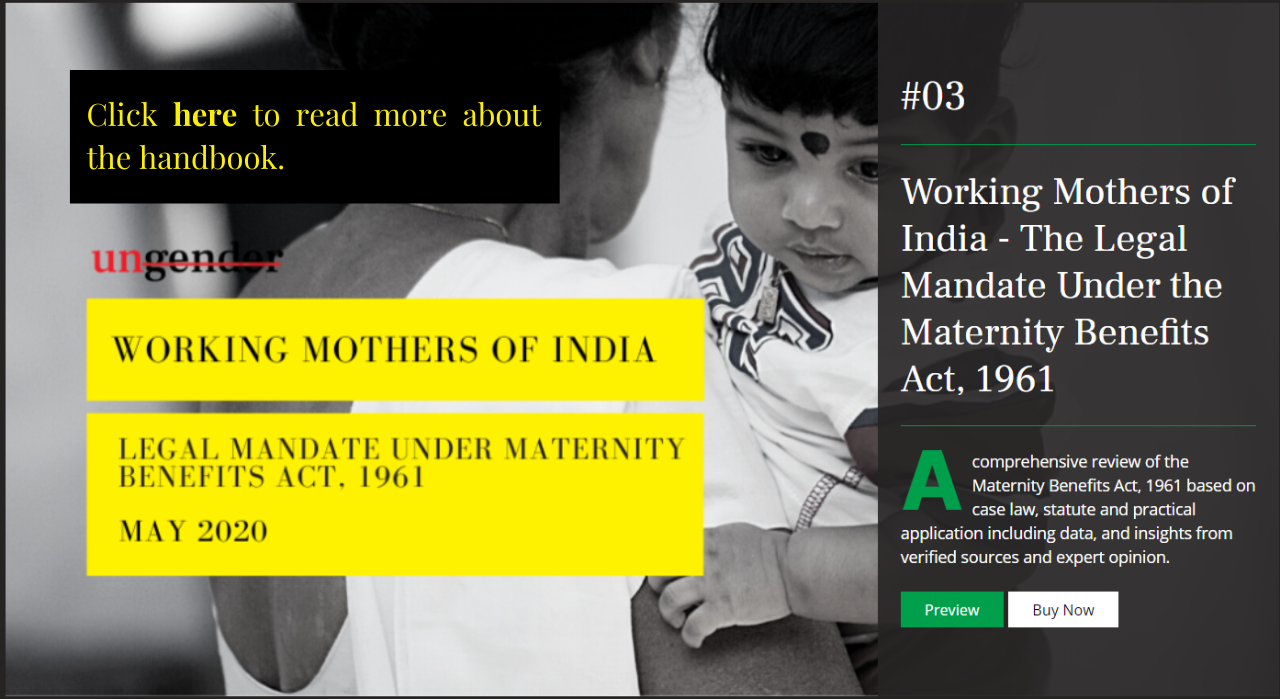Written by: Karan Arora
What is the Maternity Benefit (Amendment) Act of 2017?
On 3rd April 2017, the Maternity Benefit Act, 1961 was amended and given Presidential assent. The changes made to the Maternity Benefits Act, 1961 have been made to encourage women’s participation in labor force and to improve the work-life balance of women employed in the organized sector. The Amendment Act has been implemented to protect the employment of expectant mother and entitles them to paid Maternity Leave.
The amendment is in line with the recommendations of the 44th, 45th, and 46th sessions of the Indian Labor Conference convened by the Ministry of Labor and Employment, as well as in line with the recommendations made by the Ministry of Women and Child Development. The act paves the way for the ratification of the International Labor Convention no. 183 that provides for 14 weeks of maternity leave benefit to women.
Who is required to comply?
Any establishment being a factory, mine, plantation, Government establishment, and any other establishment that is industrial (IT Manufacturing), commercial (Malls, Cinemas, Hospitals) or agricultural in nature, having 10 or more employees, in the territory of India (except the state of Jammu and Kashmir) is required to comply with the Act. The act, however, does not apply to any factory or other establishment to which the provisions of the Employees’ State Insurance Act, 1948 apply.
Who’s the beneficiary?
Any woman working full-time in the above-mentioned establishments of the organized sector for a period of more than 80 days in the 12 weeks preceding the date of her excepted delivery, or date of the child being handed over to her (In case of adopting and commissioning mothers) is entitled to all benefits given by the act.

What did the Maternity Benefit Act, 1961, mandate?
1. Twelve weeks of leave from employment for expecting mothers.
Establishments were mandated to provide expectant mother with 12 weeks of paid leave from employment, of which not more than six weeks were to precede the date of her expected delivery. They were prohibited from employing women during the six weeks immediately following the day of her delivery. They were also prohibited to require employee to partake in any work which was either of:
- Arduous nature
- Involved long hours of standing
- Any work which was likely to interfere with pregnancy or the normal development of the fetus from a period of one month immediately preceding the date of her expected delivery.
2. Right to disbursement of maternity benefits.
Establishments were entitled to provide expectant female employees with monetary maternity benefit at the rate of the average daily wage [1] for up to 12 weeks, out of which nor more than 6 weeks were to precede the date of her expected delivery. However, no female employee was entitled to this benefit unless she had worked under the employer, from whom she was claiming maternity benefit, for a period of 80 days in the 12 months preceding the date of expected delivery.

3. Protections for women in difficult situations.
- Protection for women suffering from miscarriage, undergoing Medical Termination of Pregnancy, suffering from illness arising out of pregnancy, delivery, premature birth of the child, or miscarriage.
- Establishments were also required to provide adequate coverage to women who do not undergo successful delivery, or suffer from post-partum illnesses.
- In case of miscarriage or medical termination of pregnancy, the act entitles women to leave with wages at the rate of maternity benefits, for a period of 6 weeks following the day of termination of her pregnancy.
- In case of any post-partum illness, a woman is entitled, in addition to the period of absence allowed to her under the maternity benefit, to leave with wages at the rate of maternity benefit for a maximum of one month.
4. Unlawful for employer to dismiss employing during absence of pregnancy.
Section 12 of the Act stated that it would be unlawful for an employer to discharge or dismiss a female employee on account of absence of pregnancy (maternity leave). The discharge of a female employee on any other grounds, while she is on maternity leave, would not deprive her of the maternity benefits, unless it is on the account of gross misconduct.
What does the Maternity Benefits (Amendment) Act, 2017 mandate?
1. Increase in maternity leave duration to 26 weeks
Establishments are now required to provide 26 weeks of paid Maternity Leave, of which no more than 8 weeks should precede the date of expected delivery. Establishments must keep must also keep in mind that the 26 weeks of maternity leave are only mandated for the first two successful pregnancies. For the third and fourth child, the paid leave entitlement will be 12 weeks each, of which no more than 6 weeks should precede the expected date of delivery.
2. Maternity leave of 12 weeks for adopting and commissioning mothers
Establishments are required to provide 12 weeks of paid maternity leave to women employees who adopt a child below the age of 3 months, or a commissioning mother (Mothers who have children through surrogacy). The 12-week period will be calculated from the date the child is handed over to the adopting or commissioning mother.

3. Option to work from home
The act has a provision under which an employer can permit a woman to work from home, provided the nature of the work permits her to do so, even after the availing of maternity leave benefit. The terms and conditions, as well as the duration of the arrangement, must be as per an agreement between the employer and woman.
4. Creche facility mandatory for establishments with 50 or more employees.
Establishments having 50 or more employees are now required to have the facility of a creche or a children’s day car within such distance as may be prescribed, either individually or as a common facility. An employer is then required to allow four visits a day to the creche by the woman, which also includes the interval for rest allowed to her. The provisions allow women to take care of their children even after the termination of the maternity leave and a return to employment.
5. Awareness about Maternity Benefits
Every establishment is required to intimate in writing as well as electronically to every woman at the time of her appointment, regarding every benefit available under the Act. All other (unchanged) clauses of the Maternity Benefits Act, 1961 are carried over.

What happens if the employer (establishment) does not comply?
If any employer fails to pay any amount of maternity benefit to a woman, who is entitled under this act, or discharge or dismisses such a woman on account of her absence from work due to maternity leave, he shall be punishable with imprisonment for a minimum period of 3 months and maximum of a year along with a fine of minimum INR 2000 and maximum INR 5000.
Penalties for obstructing an Inspector of this act
Section 14 of the act talks about the appointment of Inspectors under this act, who have the power of examining any registers, records and notices to ensure that the act is being implemented. The Inspector also has the power of directing payments to the aggrieved party. The Inspector may also make an inquiry if he is satisfied that either a payment has been wrongfully withheld, or a female employee has been discharged or dismissed on account of her absence of pregnancy.
If an establishment fails to produce (on the demand of the inspectors) any registers, records and notices kept in pursuance of this act, they are punishable with imprisonment (which may extend to one year) or with fine (which may extend five thousand rupees), or with both.
[1] The average daily wage would be the average of wages paid to the woman for the days on which she has worked during the period of three calendar months preceding the date from which she absents herself on account of maternity.About The Author: Karan Arora is a final year law student with a keen interest in labour laws and labour compliance.
Ungender Insights is the product of our learning from advisory work at Ungender. Our team specializes in advising workplaces on workplace diversity and inclusion. Write to us at contact@ungender.in to understand how we can partner with your organization to build a more inclusive workplace.








